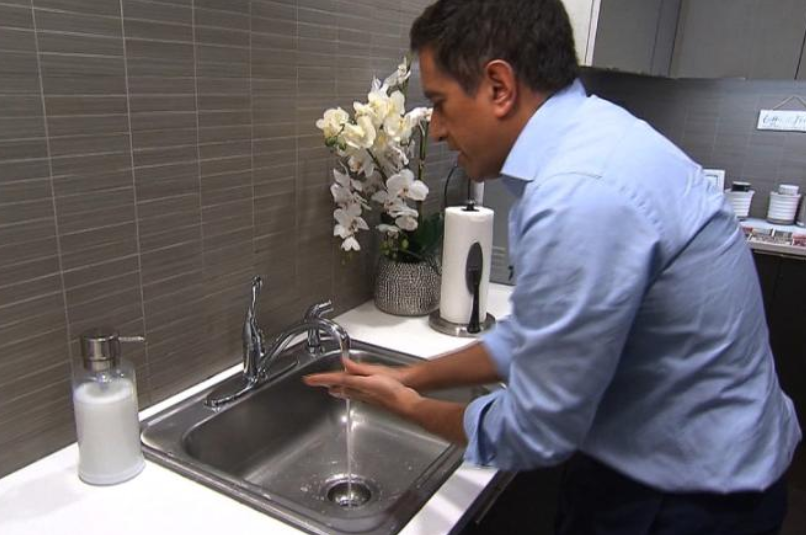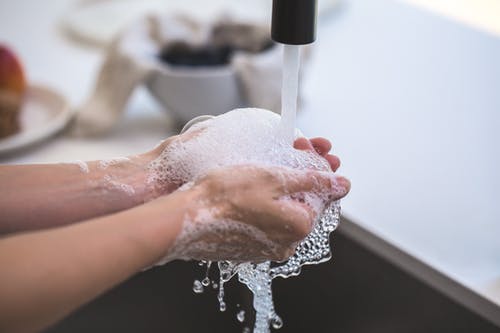研究发现,越来越多的人开始记得洗手
研究发现,越来越多的人开始记得洗手
Dr. Sanjay Gupta shows the proper way to wash your hands.
桑杰·古普塔博士展示了正确的洗手方法。

More people are remembering to wash their hands during the pandemic, but some groups still need a reminder, according to new research published Thursday.
周四公布的一项新研究显示,在流行病期间,越来越多的人开始记得洗手,但仍有一些群体需要提醒。
The US Centers for Disease Control and Prevention looked at how likely adults were to say they had remembered to wash their hands in six scenarios: after using the bathroom at home; after using the bathroom in public; after coughing, sneezing or blowing their nose; before eating at home; before eating at a restaurant; and before preparing food at home.
美国疾病控制和预防中心研究了成年人在六种情况下记得洗手的可能性:在家上完厕所后;在公共场所使用卫生间后;咳嗽、打喷嚏或擤鼻涕后;在家里吃饭之前;在餐厅吃饭前;在家准备食物之前。
Comparing October 2019 with June 2020, the odds of a person remembering to wash their hands after coughing, sneezing or nose blowing were 2.3 times higher in 2020; before eating at a restaurant were 2.0 times higher; and before eating at home were 1.7 times higher, according to research published in the CDC's Prevention's Morbidity and Mortality Weekly.
美国疾病控制和预防中心《每周发病率和死亡率》上发表的一项研究显示,2019年10月和2020年6月相比,2020年一个人咳嗽、打喷嚏或擤鼻涕后记得洗手的几率是2019年的2.3倍;2020年在餐馆吃饭之前记得洗手的几率是2019年的2倍;2020年在家吃饭前记得洗手的几率是2019年的1.7倍。
In 2020, 71.2% of participants reported remembering to wash their hands after coughing, sneezing or blowing their noses compared with 53.3% in 2019. For eating at a restaurant, the number increased from 55.2% in 2019 to 70.6% in 2020 and before eating it home it went from 62.8% in 2019 to 74.4% in 2020.
2020年,71.2%的受访者表示咳嗽、打喷嚏或擤鼻涕后记得洗手,而2019年这一比例为53.3%。在餐馆吃饭前记得洗手的人数比例从2019年的55.2%上升到2020年的70.6%,在家里吃饭前记得洗手的人数比例从2019年的62.8%上升到2020年的74.4%。
Men and women both reported washing their hands more frequently before eating at home or in a restaurant and after coughing, sneezing or blowing their noses in 2020.
据报道,2020年,男性和女性在家中或餐馆用餐前以及咳嗽、打喷嚏或擤鼻涕后洗手的频率都更高。

In both 2019 and 2020, "higher percentages of older adults, women, Black persons, and Hispanic persons reported remembering to wash their hands in multiple situations than did young adults, men, and White adults," the report said.
该报告称,在2019年和2020年,“老年人、女性、黑人和西班牙裔受访者在多种情况下记得洗手的比例高于年轻人、男性和白人。”
The study does have some limitations, including the fact that the design does not specify whether changes in handwashing were due to the pandemic and that the survey relied on self-reported data.
这项研究确实有一些局限性,包括设计中没有明确说明洗手习惯的改变是否由大流行引起,以及这项调查依赖于自我报告的数据。
"Men, young adults and White adults continue to be less likely to remember to wash their hands, despite improvements made from 2019 to 2020," said the authors, suggesting that there is additional work needed to identify strategies to remind and motivate these groups to wash their hands.
“尽管从2019年到2020年有所改善,但男性、年轻人和白人成年人仍然不太可能记得洗手,”作者说,这表明还需要进一步的工作来确定提醒和激励这些群体洗手的策略。
Another new study found that women appear to be washing their hands, wearing masks and social distancing regularly to a greater degree than men.
另一项新的研究发现,与男性相比,女性洗手、戴口罩和经常保持社交距离的频率更高。
Women aren't just better at taking preventative measures, researchers at New York University and Yale University said. Women were also more likely to express alarm and anxiety in response to Covid-19 and listen to experts, the study, which was published this week in the journal Behavioral Science & Policy, said.
纽约大学和耶鲁大学的研究人员称,女性不仅更善于采取预防措施。本周发表在《行为科学与政策》杂志上的这项研究称,女性在应对Covid-19时也更有可能表达警惕和焦虑,并听取专家的意见。


















